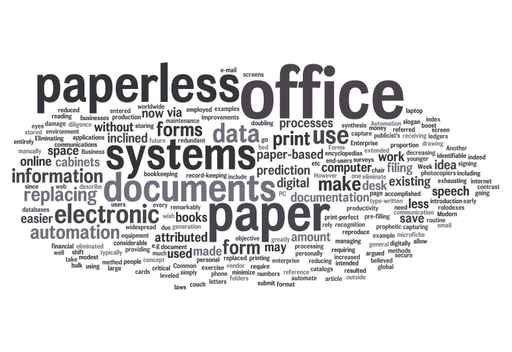Moving Towards a Paperless Office
For many businesses, files and archives take up a significant amount of space on their premises. The information in these files may be related to past transactions or projects, but is kept because of its legal importance or, as is often the case, just in case it’s needed in the future. Unfortunately papers and files can take up a large amount of space which, if cleared, could mean more desks, storage for other items or simply a tidier office.

Many modern offices are paperless, or are trying to cut down on the paper records they store. The main advantages of this are the space issue, mentioned above, and also ease of finding things. Imagine having to hunt through an entire library of files just for one old invoice, only to find it’s either been misfiled or the ink has faded, making it unreadable. Now imagine how much easier it would be if you could find that invoice at the click of a button, and display it on a computer, printing out a copy if required. That’s why having a paperless office is so desirable to many companies!
Deciding to move existing records to electronic files is a daunting prospect and can take a lot of time. One option is to employ temporary staff to do this work, however this can be quite costly and time consuming in terms of training, so many companies outsource the scanning work. For this kind of project, there are companies who specialise in document scanning, so this is one option. Most of these companies will either return or shred and recycle your papers after they’re scanned, and can store files to your own requirements, to help you get your new paperless system started easily.
A major consideration with a paperless office is what would happen in the event of a computer failure. Files should never be stored on just one computer as this leaves them open to being lost or corrupted. You should ideally use several methods of backing up your files, which could include a removable hard drive, disk or cloud storage. Many companies now opt for cloud storage because it means the files are stored offsite. In the unfortunate event of the premises being damaged or otherwise compromised, a copy of your files would still exist. You can use as many different methods of backing up your data as you wish, however it’s important to keep them all regularly backed up, perhaps setting up an automated backup to run at a specified time each day or each week.
Once your office has been changed to a paperless one, it’s important that everyone knows how to maintain it. This means not printing emails if they can be viewed on a screen instead, keeping up to date with the scanning process of any new paperwork that is generated, and storing things in the correct way.
A paperless office can save time, money and help the environment so, if your business is still bogged down with files, consider making the change to paperless working and see how much more efficiently your business runs.
Jan Cahill heads up the customer services team at Clear Data, one of the UK’s leading document management companies. Visit www.cleadatagroup.co.uk to find out more about thier services and how you too can work towards a paperless future.


